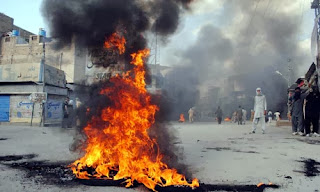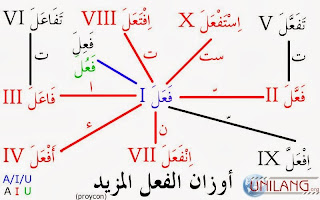The sectarian violence that is racking Pakistan reminds me of a passage from Gai Eaton’s extraordinary book - “Islam & The Destiny of Man”:
“...vice always pays its tribute to virtue by masquerading behind the mask of religion [...] and both wickedness and stupidity walk the streets more confidently when decently clothed. It would be foolish and, to say the least, counter-productive to seek arguments to excuse divisions within the Ummah [...] or the hysteria of zealots who have forgotten the fundamental law of Mercy and the binding obligation to make use of the gift of Intelligence.”
There is no doubt that wickedness, stupidity, hysteria, and zealotry are at work. And so too is another factor - ignorance. And while there is not much that can be done about the former, the latter can certainly be addressed.
In a country where two thirds of the population is illiterate, people do not learn hatred spontaneously. They have to be taught. So blame, if blame is to be apportioned, ultimately lies with the scholars of the respective sects. Or at least with those scholars who incite hate and violence against others. For too long have we tolerated these ‘ersatz scholars’. And for too long have we been silent in confronting them with the clear, unambiguous and unrelenting call to unity that Islam makes to its followers - all its followers.
While sects differ on many issues there is no dispute on the absolute authority of the Qura'n. And so necessarily this has to be the basis on which we challenge the ersatz scholars who sow division and hatred between Muslims. Because even they cannot reject what the Qura'n has to say.
Lets start with Ayat 103 of Al-Imran:
وَاعْتَصِمُوا بِحَبْلِ اللَّهِ جَمِيعًا وَلَا تَفَرَّقُوا ۚ وَاذْكُرُوا نِعْمَتَ اللَّهِ عَلَيْكُمْ إِذْ كُنتُمْ أَعْدَاءً فَأَلَّفَ بَيْنَ قُلُوبِكُمْ فَأَصْبَحْتُم بِنِعْمَتِهِ إِخْوَانًا وَكُنتُمْ عَلَىٰ شَفَا حُفْرَةٍ مِّنَ النَّارِ فَأَنقَذَكُم مِّنْهَا ۗ كَذَٰلِكَ يُبَيِّنُ اللَّهُ لَكُمْ آيَاتِهِ لَعَلَّكُمْ تَهْتَدُونَ
And hold fast (Oh Muslims) together to the Rope of Allah (this Qur'an), and be not divided among yourselves. And remember Allah's Favour on you, for you were enemies one to another and He created affection between your hearts so that you became brothers by His Grace. And (before this) you were standing on the brink of a canyon of fire. And He saved you from it. This is how Allah makes clear to you His Signs (Ayaat) so that you may be guided (to the right path)
Notice that the Arabic uses the imperative for the operative verbs here. And so the exhortation to ‘hold fast’ and ‘be not divided’ are in fact commands. Muslim scholars of old - men who first wrote the detailed exegeses - tafseers - of the Qura'n - maintain that this ayat makes unity amongst the Muslims mandatory - wajib in Arabic. And division between them a sin.

Let’s also remember that the men who wrote these tafseers attained a level of scholarship that is simply not possible in the modern period. They were close - in time - to the source of the revelation. They were accomplished Arabic grammarians. Many of them had studied and memorized thousands of verses of Arabic poetry which was prevalent in Arabia during the Jahiliyya - the period preceding Islam. This was necessary because the Qura'n was heard and understood first by people who knew the language of the Jahiliyya. And finally they traveled the deserts of Arabia searching for beduins - the bearers of the purest Arabic - to understand better the language of the Qura'n.
Next consider Ayat 46 of Surat Al-Anfal:
وَأَطِيعُوا اللَّهَ وَرَسُولَهُ وَلَا تَنَازَعُوا فَتَفْشَلُوا وَتَذْهَبَ رِيحُكُمْ ۖ وَاصْبِرُوا ۚ إِنَّ اللَّهَ مَعَ الصَّابِرِينَ
And obey Allah and His Messenger, and do not dispute (with one another) and if you do, you will fail and lose your strength. And be patient. Surely, Allah is with those who are As-Sabireen (the patient).
Again the Arabic uses the imperative for the verb ‘do not dispute’. Further the word translated as ‘dispute’ has a broader meaning which includes: argue, squabble, spar.
Or consider Ayat 9 of Surat Al-Hujaraat:
وَإِن طَائِفَتَانِ مِنَ الْمُؤْمِنِينَ اقْتَتَلُوا فَأَصْلِحُوا بَيْنَهُمَ
And if two parties or groups among the believers fight each other, then make peace between them both.
The imperative appears once more in urging Muslims to make peace between groups that clash with each other. The next Ayat of the same Surat is even more emphatic:
إِنَّمَا الْمُؤْمِنُونَ إِخْوَةٌ فَأَصْلِحُوا بَيْنَ أَخَوَيْكُمْ ۚ وَاتَّقُوا اللَّهَ لَعَلَّكُمْ تُرْحَمُونَ
The believers are indeed brothers (in Islam). So make reconciliation between your brothers, and be aware of Allah so that His Mercy may surround you.
Notice especially here that those who believe become, by virtue of that belief, brothers in Islam.
Next look at Ayat 92 of Surat Al-Anbiya:
إِنَّ هَـٰذِهِ أُمَّتُكُمْ أُمَّةً وَاحِدَةً وَأَنَا رَبُّكُمْ فَاعْبُدُونِ
Indeed! This, your Ummah (Oh Muslims), is one Ummah , and I am your Lord, therefore worship Me (Alone).
Notice that the Ayat does not say that your ‘Ummah is an Ummah of many sects’. It says simply and eloquently: You, the Muslims, are a single people.
The Ayats quoted above in using the imperative affirm that unity amongst Muslims is obligatory not optional. But the Qura'n also uses other methods to exhort Muslims to shun division. One of these is in the form of a warning of the consequences of failing to heed its call to unity. Consider Ayat 65 of Surat Al-Anaam:
قُلْ هُوَ الْقَادِرُ عَلَىٰ أَن يَبْعَثَ عَلَيْكُمْ عَذَابًا مِّن فَوْقِكُمْ أَوْ مِن تَحْتِ أَرْجُلِكُمْ أَوْ يَلْبِسَكُمْ شِيَعًا وَيُذِيقَ بَعْضَكُم بَأْسَ بَعْضٍ ۗ انظُرْ كَيْفَ نُصَرِّفُ الْآيَاتِ لَعَلَّهُمْ يَفْقَهُونَ
Say (Oh Mohammad): "He has power to send torment on you from above or from under your feet, or to divide you into sects and make you taste the violence of one another." See (Oh Mohammad) how We explain the Signs (Ayaat) so that they may understand.
Another method is to describe the qualities of love and respect and support for each other that unity brings to Muslims. This is Ayat 71 from Surat Al-Tauba:
وَالْمُؤْمِنُونَ وَالْمُؤْمِنَاتُ بَعْضُهُمْ أَوْلِيَاءُ بَعْضٍ ۚ يَأْمُرُونَ بِالْمَعْرُوفِ وَيَنْهَوْنَ عَنِ الْمُنكَرِ وَيُقِيمُونَ الصَّلَاةَ وَيُؤْتُونَ الزَّكَاةَ وَيُطِيعُونَ اللَّهَ وَرَسُولَهُ ۚ أُولَـٰئِكَ سَيَرْحَمُهُمُ اللَّهُ ۗ إِنَّ اللَّهَ عَزِيزٌ حَكِيمٌ
The believers, men and women, are Auliya' (helpers, supporters, friends, protectors) of one another; they enjoin Al-Ma'ruf (all that is good), and discourage Al-Munkar (all that is vile); they perform As-Salat (prayer), and give the Zakat, and obey Allah and His Messenger. Allah will surround them with His Mercy. Surely Allah is All-Mighty, All-Wise.
And so the Qura'n uses a multiplicity of methods to make clear the primal importance of unity amongst Muslims. And yet, here we are in today’s Pakistan, polarized by division, strife and gratuitous violence. Ignorance of the basic principles of our religion is clearly responsible. But equally responsible are those who lead the country. They are responsible because they have failed to challenge - for fear or ignorance - the ersatz scholars who are spreading hate and division.
If the people who lead Pakistan are worth their salt they should take this bull by the horns. The Prime Minister should appear on TV, recite some of the Ayats mentioned here and declare that the state will not tolerate religious violence of any kind. Parliament should enact laws allowing for trial and imprisonment of scholars, masjid imams, or anyone else calling for religious intolerance or violence.
All of this is backed by the clear declarations of the Qura'n whose authority is unchallenged by all sects. And so no one will be able to object.
In closing let me quote Ayat 256 from Surat Al-Bakara:
لَا إِكْرَاهَ فِي الدِّينِ ۖ قَد تَّبَيَّنَ الرُّشْدُ مِنَ الْغَيِّ ۚ فَمَن يَكْفُرْ بِالطَّاغُوتِ وَيُؤْمِن بِاللَّهِ فَقَدِ اسْتَمْسَكَ بِالْعُرْوَةِ الْوُثْقَىٰ لَا انفِصَامَ لَهَا ۗ وَاللَّهُ سَمِيعٌ عَلِيمٌ
The translation reads: There is no compulsion in religion. The right direction is henceforth distinct from error. And he who rejects false deities and believes in Allah has grasped a firm handhold which will never break. Allah is Hearer, Knower.
Nadeem M Qureshi is Chairman of Mustaqbil Pakistan. He has an MA in Arabic.
 The Raj ended in 1947 when the Subcontinent was partitioned creating the new nations of India and Pakistan. It made sense at the time for Pakistan, as it found its feet, to retain the legal and administrative structure left by the Raj. Today, 67 years later, the same laws remain on the books. Yes, some minor modifications have been made. These are largely superficial to do with definitions, terminology and temporal adjustments. But, in essence, the entire legal system of Pakistan remains as the British left it.
The Raj ended in 1947 when the Subcontinent was partitioned creating the new nations of India and Pakistan. It made sense at the time for Pakistan, as it found its feet, to retain the legal and administrative structure left by the Raj. Today, 67 years later, the same laws remain on the books. Yes, some minor modifications have been made. These are largely superficial to do with definitions, terminology and temporal adjustments. But, in essence, the entire legal system of Pakistan remains as the British left it.



